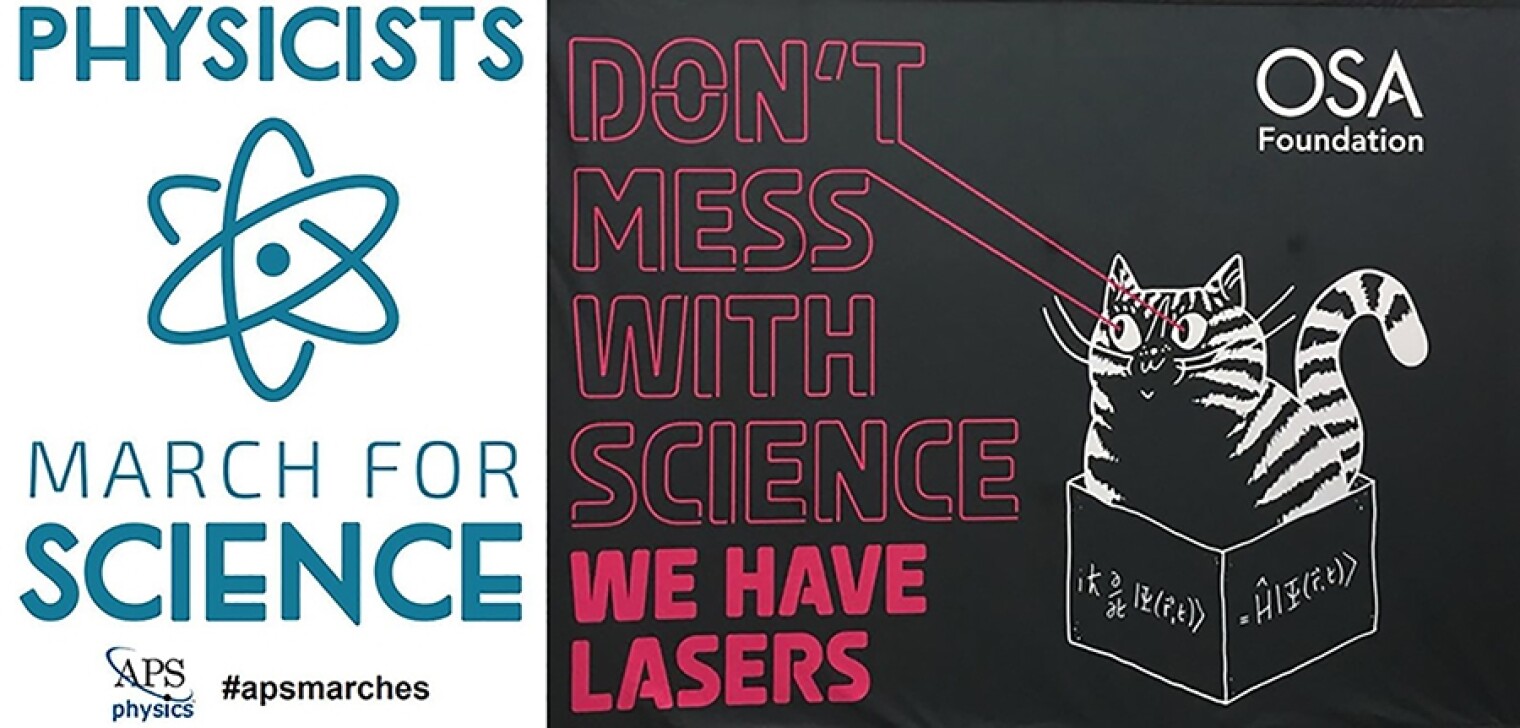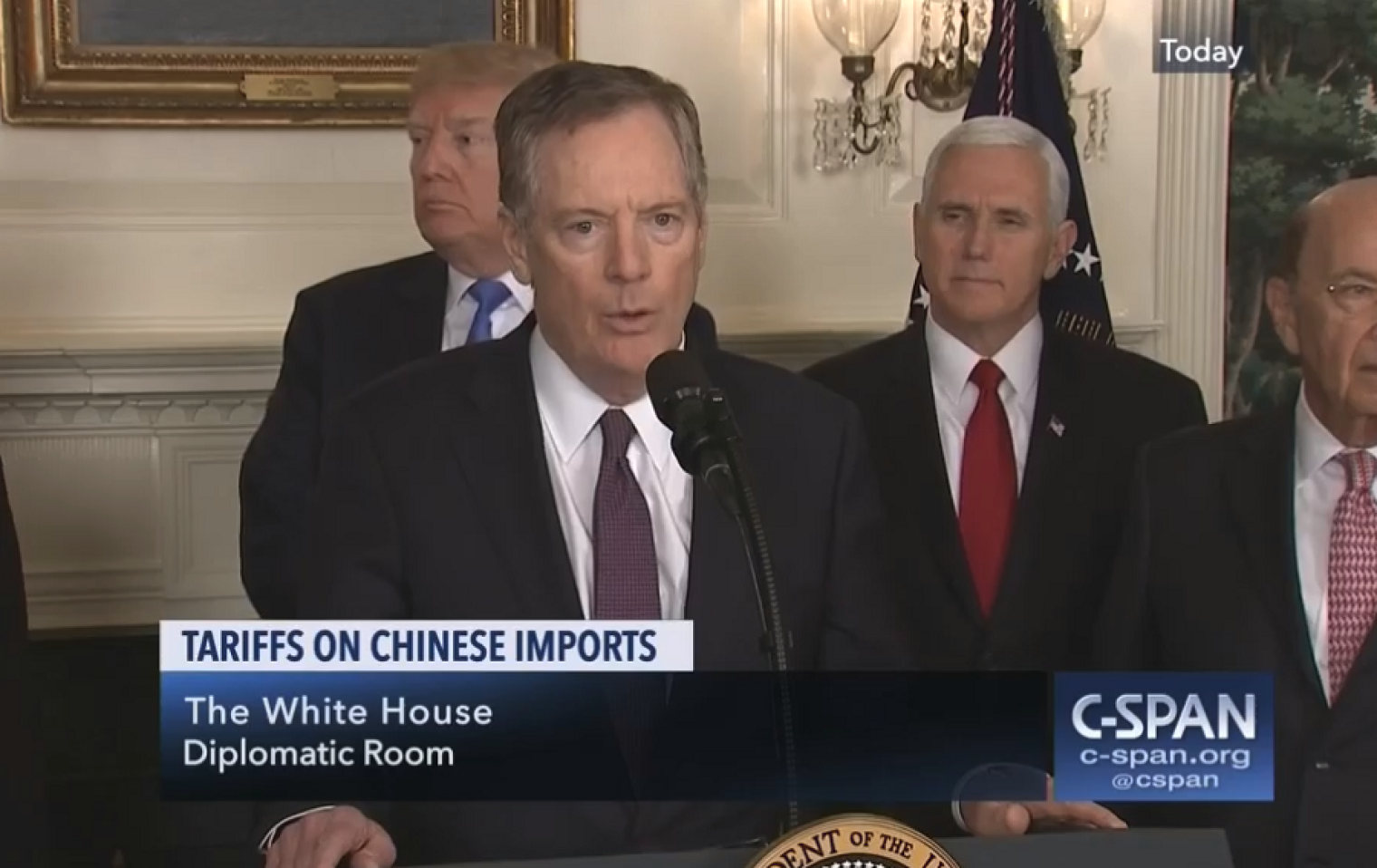| |
What’s Ahead
 |
| (Image credits – American Physical Society, The Optical Society) |
Second March for Science This Weekend
The second March for Science will take place worldwide this Saturday. The main event will be held in Washington, D.C., with over 200 satellite events in cities around the U.S. and the world. This year’s march aims to “hold our elected and appointed officials responsible for enacting equitable evidence-based policies that serve all communities and science for the common good.” The D.C. March for Science is encouraging public participation and education through teach-ins beginning on the National Mall at 9:00 am, followed by a rally at 12:30 pm. A list of speakers is available here. The march itself will begin at 2:30 pm. The Optical Society and American Physical Society, two AIP member societies, will be hosting several activities throughout the day of the march in downtown D.C., including a teach-in and an open house.
Science Committee to Examine Foreign ‘Exfiltration’ of US S&T
On Wednesday, the House Science Committee is holding a hearing to “explore foreign nations’ exploitation of U.S. academic institutions for the purpose of accessing and engaging in the exfiltration of valuable science and technology.” The hearing charter cites a series of reports by the FBI that have warned academic institutions about other nations’ intelligence collection efforts. Testifying are Michael Wessel, a member of the U.S.-China Economic and Security Review Commission; Michelle Van Cleave, head of U.S. counterintelligence efforts for three years during the George W. Bush administration; Daniel Golden, author of a 2017 book about how U.S. universities are targets for foreign and domestic espionage; and Crane Hassold, director of threat intelligence at PhishLabs. Committee Chair Lamar Smith (R-TX) is among a chorus of members of Congress who have recently raised concerns about this subject, particularly in relation to activities by China. Sen. Marco Rubio (R-FL) is another, tweeting on April 3 that he soon plans to introduce measures to deal with the issue.
FY19 Budget Hearings Resume as Congress Returns from Recess
A number of leaders from science agencies will be on Capitol Hill this week defending the president’s budget request for fiscal year 2019. Senate appropriators will be conducting their first hearings of the current budget cycle. These will also be the first budget hearings since Congress enacted a large-scale federal budget increase in its appropriations for fiscal year 2018.
Wednesday
Thursday
- Department of Energy. Perry will appear on his own before the House Energy and Commerce Committee.
- NASA. Acting NASA Administrator Robert Lightfoot will appear before the House Commerce-Justice-Science Appropriations Subcommittee.
Senate Holding Hearing on 2018 Hurricane Season
Acting head of the National Oceanic and Atmospheric Administration Tim Gallaudet will appear alongside five other witnesses before the Senate Commerce Committee on Thursday at a hearing to examine the status of local and federal preparation and response capabilities for the upcoming 2018 hurricane season. NOAA, which is the federal agency responsible for tropical storm observations, forecasting, and warnings, is slated to issue its seasonal projections for the 2018 hurricane season in May.
APS Meeting Convenes in Columbus
The American Physical Society is holding its annual April Meeting in Columbus, Ohio, starting this Saturday. Among the policy-focused events are a session on “Current trends in U.S. science policy,” a plenary lecture on “Physics and the government” by the acting director of the National Nuclear Security Administration’s Inertial Confinement Fusion program, and a forum with Rep. Bill Foster (D-IL), the only physicist in Congress. APS is also holding a town hall meeting to gather input for a new strategic planning effort.
NASA Astrophysics Advisory Committee Meeting
NASA’s Astrophysics Advisory Committee meets Wednesday and Thursday. A critical issue facing NASA’s Astrophysics Division is the delay of the James Webb Space Telescope (JWST) and the attendant suggestion that the next National Academies astronomy and astrophysics decadal survey could be pushed back. Division Director Paul Hertz will be speaking for two hours on Wednesday morning, Thomas Zurbuchen, the head of NASA’s Science Mission Directorate, will conduct an hour-long question-and-answer session on Thursday morning, and JWST Program Director Eric Smith will address the committee on Thursday afternoon. Another key issue is the descoping of the Wide Field Infrared Survey Telescope (WFIRST) and the Trump administration’s proposal to terminate it in fiscal year 2019. WFIRST project scientist Jeff Kruk will offer an update on the mission Thursday morning.
|
|
In Case You Missed It
 |
| U.S. Trade Representative Robert Lighthizer speaks at a March 22 press conference at which President Trump announced his intention to impose tariffs on Chinese products. Lighthizer oversaw an investigation into whether China’s trade practices unfairly harm American intellectual property, including R&D assets. |
Chinese High Tech Industries Among Targets of Trump Tariffs
Last week, the Office of the U.S. Trade Representative (USTR) released a list of about 1,300 categories of imports from China on which the U.S. may impose an additional 25 percent duty charge. Among the products targeted are a wide range of advanced technologies, including various types of laboratory equipment, optical devices, semiconductor manufacturing equipment, and batteries. The Trump administration argues that the tariffs, which it estimates will affect about $50 billion worth of imports, are an appropriate response to unfair trade practices and intellectual property theft by China, articulated in a USTR report released on March 22. The administration also says the tariffs are meant to counter China’s “stated intention of seizing economic leadership in advanced technology as set forth in its industrial plans, such as ‘Made in China 2025.’” The USTR is accepting comments on the proposal until May 11 and will hold a public hearing on May 15. President Trump has since said he may seek an additional $100 billion worth of tariffs. China has said it will impose retaliatory tariffs if the U.S. implements the proposal.
Republicans May Try to Roll Back Some FY18 Spending
Unhappy about the scale of the nondefense spending increases they just approved, President Trump and a group of congressional Republicans are preparing a package of up to $60 billion in rescissions that would roll back recently appropriated funds, including those in the fiscal year 2018 appropriations law that Trump signed last month. The president has legal authority to block enacted appropriations for up to 45 days, but after that the rescissions package would require a majority vote of both the House and Senate to remain in place. It is unclear if any science-related spending would be targeted. The House will also vote this week on a balanced budget amendment to the U.S. Constitution, although it is viewed as a symbolic move as passage would require two-thirds majority support in both chambers of Congress and ratification by three-fourths of the states. The increased focus on budget deficits coincides with the release this week of a major Congressional Budget Office report that is expected to project that federal deficits are accelerating.
DOE Announces Plans for Exascale Supercomputers
On April 9, Energy Secretary Rick Perry announced the Department of Energy is dedicating up to $1.8 billion to build and deploy two new exascale computers at Oak Ridge National Laboratory and Lawrence Livermore National Laboratory in the 2021 to 2023 timeframe . The new supercomputers will follow the expected deployment of the first U.S. exascale system, named Aurora, at Argonne National Laboratory in 2021. Designed to perform at speeds 50-to-100 times greater than the current top supercomputers, the new systems are expected to enable breakthroughs across scientific disciplines and industry, including in high energy physics, climate modeling, and nuclear weapons research.
Public Access Bill Gaining Momentum in California Legislature
A bill recently introduced in California that aims to expand public access to the results of state-funded research is moving towards committee markup on April 11. The bill would require that manuscripts reporting results from research funded by any state agency be made publicly available online no more than one year after their publication in a peer-reviewed journal. Its provisions are similar to those included in the “Fair Access to Science and Technology Research Act” introduced in the House last year. If passed, it would replace a current state law, expiring in 2020, that applies similar public access requirements but only to research funded by the California Department of Public Health. An earlier version of the bill would have required research manuscripts to be made publicly available within six months of publication, but the bill’s sponsor last week announced the change to a 12-month embargo, alongside other changes.
|
|
Events This Week
Monday, April 9 NOAA: Science Advisory Board meeting (continues Tuesday)
9:30 am - 5:00 pm, Mon; 8:30 am - 12:10 pm, Tue
Westin Washington Hotel (1400 M St. NW, DC)
Webcast available
Tuesday, April 10 U.S. Chamber of Commerce: TecGlobal Conference
8:30 am - 2:30 pm, Chamber of Commerce headquarters (1615 H Street NW, DC)
House: FY19 NOAA Budget
10:30 am, Appropriations Committee (H-309 Capitol Building)
House: FY19 DOE Budget
10:00 am, Energy and Commerce Committee (2123 Rayburn Office Building)
APS: April Meeting (continues through Tuesday)
Greater Columbus Convention Center (Columbus, OH)
Monday, April 16 Space Foundation: 34th Space Symposium (continues through Thursday)
Broadmoor Hotel (Colorado Springs, CO)
|
|
Opportunities Senate Science Appropriations Subcommittee Accepting Input on FY19 Budget
The Senate Commerce, Justice, Science Appropriations Subcommittee is accepting testimony from outside witnesses as it develops spending legislation for fiscal year 2019. The subcommittee is responsible for writing the appropriations bill that funds NASA, NSF, NOAA, and NIST, among other agencies. Submissions are being accepted through May 25.
National Academies Climate Communications Initiative Seeking Input
The National Academies is seeking public comment to inform its recently launched Climate Communications Initiative. Specific feedback is requested on the role the National Academies should play in climate communication, the products, formats, and types of media that would be useful, and which other organizations are communicating about climate change. Comments are being accepted through April 30.
National Academies Hiring Policy and Global Affairs Director
The National Academies is accepting applications for executive director of its Policy and Global Affairs Division. The position will be responsible for overseeing all division activities, including developing budgets, directing work programs, and representing the organization to high-level stakeholders, among other duties. Individuals with a Ph.D. in a related field, with at least 15 years of relevant experience are encouraged to apply.
National Academies Engineering and Physical Sciences Division Seeking Research Assistant
The National Academies is accepting applications for a research assistant position in its Division on Engineering and Physical Sciences. Position duties include maintaining report databases and researching potential study committee participants, among other responsibilities. Individuals with a bachelor’s degree in a physical science or engineering discipline are encouraged to apply.
For additional opportunities, please visit www.aip.org/fyi/opportunities. Know of an upcoming science policy opportunity? Email us at fyi@aip.org.Know of an upcoming science policy event? Email us at fyi@aip.org.
|
|
Around the Web
News and views currently in circulation. Links do not imply endorsement.
White House
Congress
Political Engagement
Science, Society, and the Economy
Education and Workforce
Research Management
- The scientific paper is obsolete. Here’s what’s next (The Atlantic, perspective by James Somers)
- Is science hitting a wall? (Scientific American, perspective by John Horgan)
- It’s time for the US to get serious about funding open access (Nature Index, perspective by Rachael Samberg, et al.)
- How researchers are ensuring that their work has an impact (Nature)
- Measuring science, technology, and innovation: A review (Annals of S&T Policy, paper by Bronwyn Hall and Adam Jaffe)
- ChemRxiv: Publishing in the age of preprint servers: Proceedings of a symposium (National Academies, report)
- AIP and The Physical Review (APS News, perspective by Fred Dylla)
- Assessing scientists for hiring, promotion, and tenure (PLOS Biology, paper by David Moher, et al.)
- Irreproducible astronomy (Physics Today)
Labs and Facilities
Energy
Space
Weather, Climate, and Environment
Defense
Biomedical
International Affairs
|
|
|
| |
| |
|
